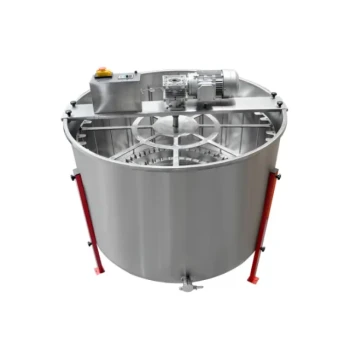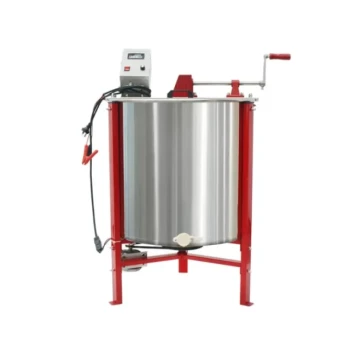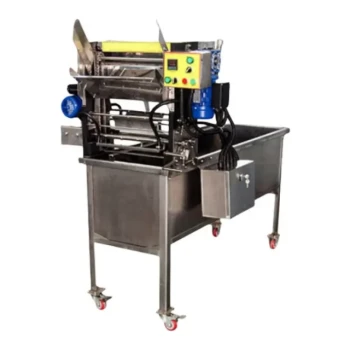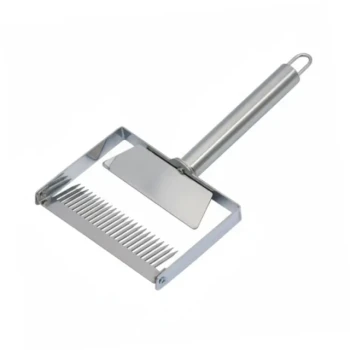Choosing the right honey extractor is a pivotal decision for any beekeeper, directly impacting the efficiency and enjoyment of your harvest. The choice boils down to a single factor: the scale of your operation. A manual extractor is the practical, cost-effective solution for hobbyists with a few hives, while an electric extractor is a necessary investment in time and labor savings for beekeepers managing ten or more hives.
Your decision is an equation balancing the initial cost against the long-term value of your time and physical effort. A manual extractor is a sensible start for a small apiary, but an electric model is an investment in efficiency that quickly pays for itself as your operation grows.
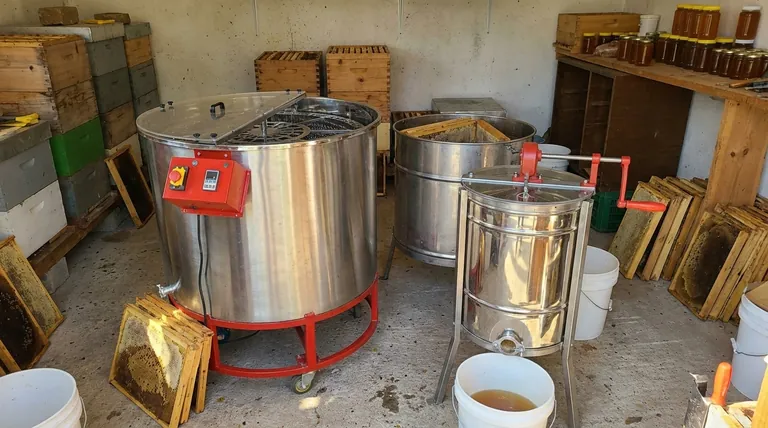
The Fundamental Difference: Hand Crank vs. Motor
The core distinction between these two tools lies in the power source, which dictates the entire harvesting experience. Understanding this difference is the first step in making an informed choice.
How a Manual Extractor Works
A manual extractor relies on your physical effort. You turn a hand crank, which spins a drum containing the honey frames. Centrifugal force pushes the honey out of the comb, where it collects at the bottom of the tank.
The speed and duration of the spin are entirely under your control. This makes it a simple and intuitive tool, especially for beginners.
How an Electric Extractor Works
An electric extractor automates the process with a motor. You set the speed and time, and the machine does the work. This provides a consistent, powerful spin that dramatically reduces physical labor.
This efficiency is the primary reason beekeepers upgrade as their number of hives increases. It transforms a physically demanding task into a supervisory one.
Key Decision Factors for Your Apiary
Beyond the mechanics, your choice must be guided by the realities of your specific beekeeping goals and resources.
Your Scale of Operation (The 10-Hive Rule)
This is the most critical factor. The consensus among experienced beekeepers serves as a reliable guide.
If you manage 1 to 5 hives, a manual extractor is perfectly sufficient and budget-friendly. The labor involved is manageable for small batches.
If you manage more than 10 hives, an electric extractor becomes a near necessity. The time and energy saved during a large harvest are significant, preventing burnout and making the process far more scalable. Those with 5 to 10 hives are in a transitional phase where the decision depends more on personal preference and future plans.
Valuing Your Time and Labor
Consider the harvest process. Extracting honey is a sticky, repetitive, and physically demanding job. A manual crank can become exhausting after just a few frames.
An electric model frees you to perform other tasks while it runs, such as uncapping the next batch of frames. You are not just buying a machine; you are buying back your time and energy.
The Initial Investment (Cost)
There is a significant price difference. Manual extractors are the entry-level option, with much lower upfront costs.
Electric extractors represent a serious financial investment. However, for a medium-to-large operation, this cost should be weighed against the value of saved labor hours over several seasons.
Understanding the Deeper Trade-offs
The choice isn't just about cost and convenience. Deeper design differences and potential pitfalls can influence your long-term satisfaction.
Tangential vs. Radial Design
This technical distinction is crucial. Most manual extractors are tangential, meaning they extract honey from one side of the frame at a time. You must manually flip each frame halfway through to extract the other side, adding time and labor.
Most electric extractors are radial, positioning frames like the spokes of a wheel. This design extracts honey from both sides simultaneously, making the process much faster and more efficient.
The Hidden Costs of a Manual Extractor
The main drawback is labor fatigue. What seems like a fun, hands-on activity can quickly become a grueling chore with larger harvests. This can diminish the joy of beekeeping.
Inexperienced users may also spin the crank too aggressively at the start, causing the weight of the honey to "blow out" and destroy the delicate wax comb.
The Learning Curve of an Electric Extractor
While automated, electric models require care. Starting the spin too fast can damage the comb just as with a manual unit. It is essential to begin slowly and gradually increase the speed.
They also require a power source and are generally heavier and more complex to clean and store than their manual counterparts.
Making the Right Choice for Your Goal
Select the tool that best serves the reality of your apiary, not just your current budget.
- If your primary focus is keeping startup costs low with 1-5 hives: A tangential manual extractor is the most practical and economical choice.
- If your primary focus is efficiency for a growing apiary (5-10+ hives): A radial electric extractor is a worthwhile investment that will save you significant time and effort for years to come.
- If your primary focus is the hands-on experience of beekeeping: A manual extractor offers a more tactile connection to the harvest, which you may prefer even with a larger number of hives.
Ultimately, the best extractor is the one that aligns with your goals and makes the honey harvest a rewarding culmination of your season's work.
Summary Table:
| Feature | Manual Extractor | Electric Extractor |
|---|---|---|
| Best For | Hobbyists (1-5 hives) | Commercial/Serious Beekeepers (10+ hives) |
| Power Source | Hand Crank | Electric Motor |
| Typical Design | Tangential (flip frames) | Radial (extract both sides at once) |
| Initial Cost | Lower | Higher |
| Labor Intensity | High (physically demanding) | Low (automated) |
| Key Advantage | Lower cost, simplicity | Time savings, efficiency for large harvests |
Ready to upgrade your honey harvest? Whether you're a hobbyist starting with a manual extractor or a commercial apiary scaling up with an electric model, HONESTBEE has the reliable, high-quality beekeeping supplies you need. We supply commercial apiaries and beekeeping equipment distributors with durable extractors designed for performance. Let our experts help you choose the perfect equipment for your operation. Contact HONESTBEE today for a quote and see how we can support your beekeeping success!
Visual Guide
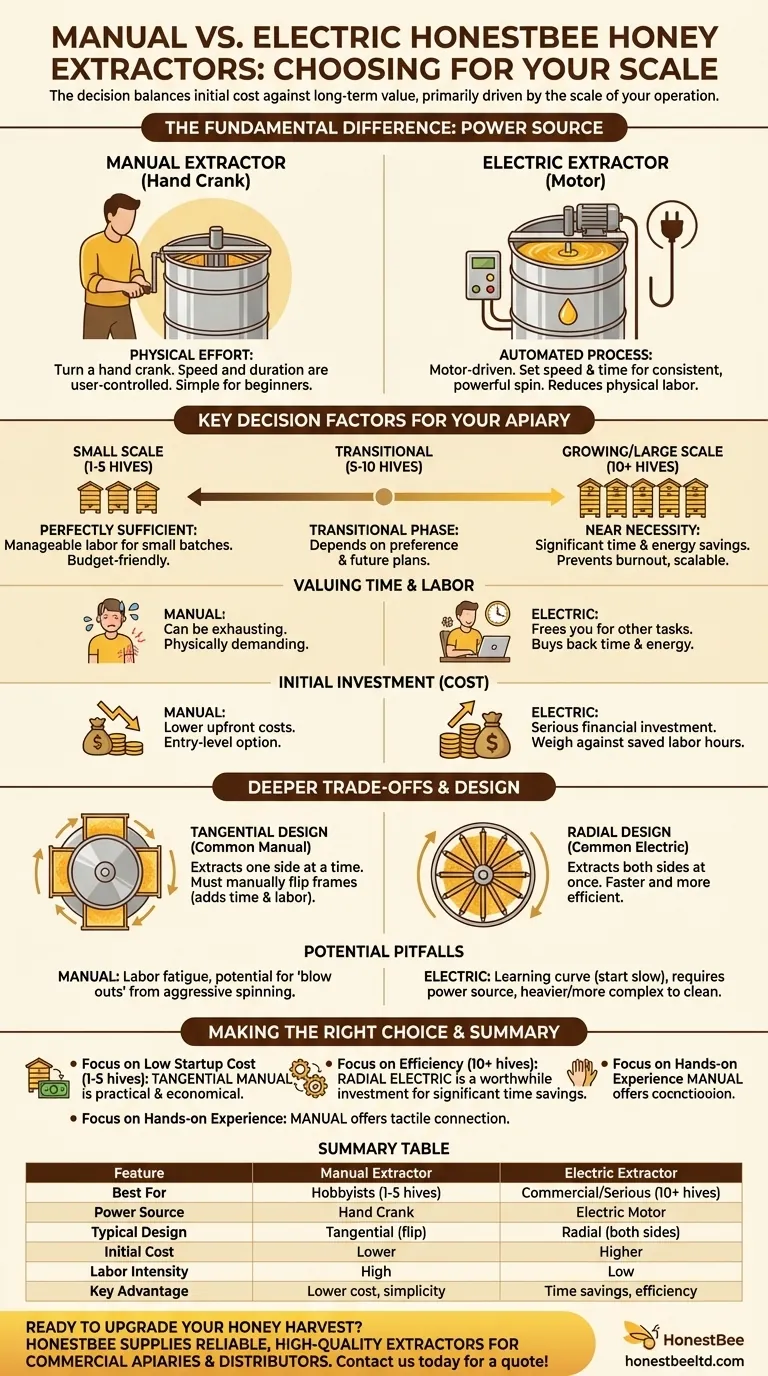
Related Products
- HONESTBEE 72 Frame Industrial Electric Honey Extractor for Beekeeping
- Electric 8 Frame Honey Spinner Extractor Equipment for Beekeeping
- HONESTBEE 3-Frame Manual Acrylic Honey Extractor
- Commercial Electric 12 Frame Honey Extractor Spinner Motorized Honey Extractor
- electric honey extractor honey centrifuge 3 frame honey extractor stainless steel honey frame extractor
People Also Ask
- How do automatic honey extractors function? Achieve High-Efficiency Honey Harvesting
- How is honey harvested from Langstroth hives? A Guide to Efficient, Comb-Preserving Extraction
- What is the energy consumption like for automatic honey extractors? Maximize Your Harvest Efficiency
- What equipment do you need to process honey? A Complete Guide for Every Scale of Operation
- What are radial honey extractors and what are their features? Maximize Your Honey Harvest Efficiency






